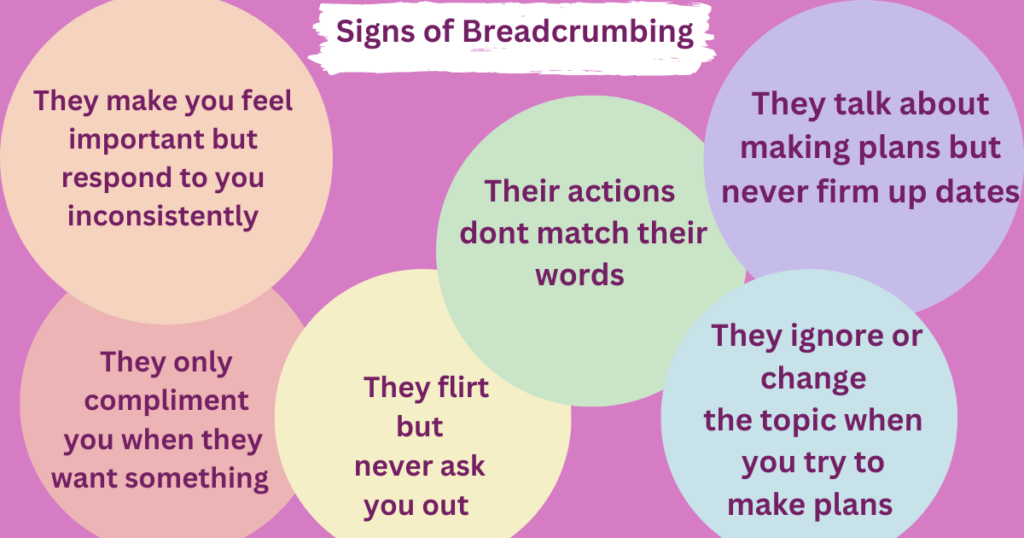11 Warning Signs Someone’s Throwing You Breadcrumbs, Not Love
Have you ever felt a confusing flicker of interest from someone, only to have it vanish as quickly as it appeared? This emotional tug-of-war might be a sign of breadcrumbing.

Breadcrumbing is a subtle but manipulative dating tactic where someone throws out small bits of affection or attention, like breadcrumbs, to keep you interested without ever committing to a real connection. It’s a way to string you along and exploit your emotions for their own benefit.
This article dives deep into the world of breadcrumbing, exploring what it is, why people do it, and the red flags to watch out for. We’ll also equip you with strategies to protect yourself from this emotional manipulation and move towards healthier relationships.
Table of Contents
Breadcrumbing: A Trail of Empty Promises in Modern Relationships
Have you ever felt like you’re constantly chasing after someone’s affection, only to come up empty-handed? This emotional rollercoaster might be a sign of you being breadcrumbed. Breadcrumbing is a manipulative tactic that thrives on inconsistency, leaving you confused and yearning for more.

Scattered Signs of Interest: The Deceptive Crumbs
Breadcrumbing manifests through fleeting moments of interest, strategically scattered to keep you engaged. These breadcrumbs can appear in various forms:
- Fleeting Digital Affection: A flirty text here, a suggestive social media comment there, followed by an unexplained radio silence. These digital crumbs create a facade of interest, but lack the substance of genuine conversation.
- The Allure of Last-Minute Plans: Spontaneous plans that get canceled repeatedly leave you feeling disappointed and questioning their commitment. This inconsistency creates a sense of uncertainty about their true intentions.
- Empty Promises and Hollow Compliments: Sugar-coated words and vague promises of a future together, with no concrete action to back them up. These breadcrumbs leave you hopeful, but ultimately unfulfilled.
- Shallow Social Media Engagement: A like here, a comment there – breadcrumbs on your social media feed that fail to translate into meaningful conversations. This superficial interaction creates an illusion of connection without any real depth.
- Late-Night Emotional Calls: Suggestive or emotionally charged late-night calls or texts can be another deceptive tactic. While these interactions create a sense of intimacy, they often lack the commitment of a stable relationship.
The hallmark of breadcrumbing is inconsistency. These breadcrumbs are just enough to pique your interest and keep you hoping for more, but never enough to solidify a real connection. This leaves you emotionally invested and confused about the true nature of the relationship.
Why Do People Breadcrumb?
While breadcrumbing leaves the recipient feeling confused and emotionally manipulated, the reasons behind this behavior can be complex. Here’s a deeper dive into why people resort to such tactics:
Playing the Field: Keeping Their Options Open
In today’s fast-paced world, commitment might seem daunting to some. Breadcrumbing allows them to indulge in a casual dynamic with multiple people. They strategically scatter these breadcrumbs of attention to maintain a pool of potential partners without the exclusivity of a committed relationship. This way, they avoid the perceived limitations of a single connection and have the freedom to explore other options.
Feeding the Ego: A Craving for Validation
Breadcrumbing can be a twisted game of validation. The person enjoys the attention and admiration they receive through those fleeting moments of interest. A flirty text or a casual compliment might inflate their ego, providing a temporary boost of self-esteem. However, they lack the courage or maturity to invest in a genuine connection that requires vulnerability and emotional reciprocity.
The Intimacy Maze: Fear of Commitment
Some people might engage in breadcrumbing due to a deep-seated fear of intimacy. They might have experienced past relationship trauma or possess an anxious attachment style that makes them apprehensive about getting close to someone emotionally. Breadcrumbing allows them to maintain a superficial connection that fulfills a basic need for attention without venturing into the potentially vulnerable territory of a real relationship.
Pulling the Strings: Manipulation Through Mixed Signals
Perhaps the most malicious reason for breadcrumbing is manipulation. The person enjoys the power dynamics of keeping you emotionally invested while remaining detached. By offering inconsistent attention and affection, they control the pace of the relationship and your emotional state. This manipulative tactic keeps you available whenever they need an ego boost or companionship, but leaves you feeling unsure and questioning your own worth.
11 Signs You’re Being Breadcrumbed
Breadcrumbing can be a frustrating and confusing experience. The subtle nature of the behavior can leave you questioning your own intuition. But fret not, there are tell-tale signs that can help you identify if you’re being breadcrumbed. By recognizing these red flags, you can protect yourself from emotional manipulation and invest your energy in healthier relationships.
1. Inconsistent Communication: A Fading Signal
The most glaring sign of breadcrumbing is inconsistent communication. They might shower you with texts or calls for a brief period, only to vanish for days or even weeks on end. This unpredictable pattern creates a sense of uncertainty and makes it difficult to gauge their true interest.
2. Empty Promises and Broken Plans: A Trail of Dust
Does your partner constantly dangle promises of spending quality time together or taking the relationship to the next level? Yet, these plans conveniently fall through or never materialize? This pattern of empty promises is a classic breadcrumbing tactic. They create a false sense of hope and commitment, but ultimately deliver nothing concrete.
3. Surface-Level Interactions: Skimming the Surface
Conversations with a breadcrumber often lack depth and feel superficial. They might shy away from discussing personal matters, their future plans, or anything that requires emotional vulnerability. The focus remains on trivial topics, leaving you with little insight into their true feelings or intentions.
4. Late-Night Casanova: Exploiting Vulnerability
Beware of those who primarily reach out late at night, especially if their messages take on a flirtatious or suggestive tone. This tactic preys on your emotional vulnerability at night, creating a temporary illusion of intimacy. However, these late-night encounters rarely translate into meaningful daytime interaction.
5. Allure of the Physical: Shallow Admiration
If their interest seems primarily focused on your physical appearance, it might be a sign of breadcrumbing. Their compliments or comments might be overly sexualized, and they show little regard for your personality, goals, or aspirations.
6. Hot and Cold Behavior: An Emotional Rollercoaster
Breadcrumbers often exhibit hot and cold behavior. They might shower you with affection one minute and then completely withdraw the next. This emotional inconsistency leaves you feeling confused, insecure, and constantly chasing after their approval.
7. Disinterest in Your World: A One-Sided Conversation
Does your partner show minimal interest in your life, hobbies, or dreams? Do conversations revolve mostly around them and their interests? This lack of reciprocity is a sign that they are not emotionally invested in getting to know the real you.
8. Social Media Charade: Likes Don’t Translate to Action
They might be enthusiastic about liking and commenting on your social media posts, creating an illusion of connection. However, this online activity rarely translates into real-life interaction or genuine conversation. There’s a clear disconnect between their virtual enthusiasm and their lack of effort to connect in person.
9. Lost in Confusion: The Emotional Toll
A significant sign of breadcrumbing is the constant state of confusion and frustration you experience. You’re left wondering where you stand in the relationship, questioning your own intuition, and feeling emotionally drained.
10. Feeling Like an Option, Not a Priority: On the Back Burner
Breadcrumbing often leaves you feeling like just one of many options they’re keeping in reserve. They prioritize their needs and desires, with little regard for yours. You constantly feel like an afterthought, not a valued partner.
11. Dismissed Needs and Ignored Feelings: A One-Way Street
If your partner makes no effort to accommodate your schedule, needs, or feelings, it’s a red flag. A healthy relationship involves mutual respect and consideration. Breadcrumbers prioritize their own convenience and show little regard for your emotional well-being.
How to Deal with Breadcrumbing ?
If you suspect you’re being breadcrumbed, here are some steps to take:
1. Recognize the Red Flags: Be honest with yourself about the pattern of behavior. Acknowledge the inconsistency and lack of genuine effort.
2. Communicate Your Needs: If you’re interested in something more, have an open conversation about your expectations. However, don’t be surprised if they’re unwilling or unable to commit.
3. Don’t Respond to Every Text or Social Media Interaction: Reduce your availability and resist the urge to reply immediately.
4. Invest Your Time and Energy Elsewhere: Focus on people who genuinely care about you and invest your time and energy in building healthy relationships.
5. Set Boundaries: Don’t be afraid to set boundaries and distance yourself from someone who is breadcrumbing you. You deserve respect and genuine connection.
6. Prioritize Your Self-Esteem: Don’t let their behavior diminish your self-worth. Remind yourself of your value and what you deserve in a relationship.
7. Practice Self-Care: Engage in activities that make you feel good and nourish your well-being.
8. Move On: If they’re unwilling to meet your needs or show genuine interest, it’s time to walk away. There are plenty of people out there who will treat you with the respect and affection you deserve.
9. Building Healthy Relationships: Here are some tips for building healthy relationships:
- Communicate openly and honestly.
- Respect each other’s boundaries.
- Spend quality time together.
- Support each other’s goals and dreams.
- Be there for each other through thick and thin.
You are worthy of a loving and fulfilling relationship. Don’t settle for breadcrumbs when you deserve a whole loaf!
By focusing on these qualities, you can create strong and lasting connections with people who value you.
Conclusion
Breadcrumbing is a manipulative tactic that can leave you feeling emotionally confused and drained.
By recognizing the signs and prioritizing your self-worth, you can protect yourself from this emotional manipulation and move towards building healthy, fulfilling relationships. Remember, you deserve to be loved and cherished for who you are, not strung along with fleeting moments of attention.







